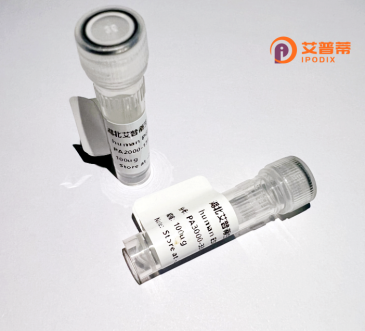
| 纯度 | >90%SDS-PAGE. |
| 种属 | Human |
| 靶点 | AVP |
| Uniprot No | P01185 |
| 内毒素 | < 0.01EU/μg |
| 表达宿主 | E.coli |
| 表达区间 | 20-124aa |
| 氨基酸序列 | CYFQNCPRGGKRAMSDLELRQCLPCGPGGKGRCFGPSICCADELGCFVGTAEALRCQEENYLPSPCQSGQKACGSGGRCAAFGVCCNDESCVTEPECREGFHRRA |
| 分子量 | 37.18 kDa |
| 蛋白标签 | GST-tag at N-terminal |
| 缓冲液 | 冻干粉 |
| 稳定性 & 储存条件 | Lyophilized protein should be stored at ≤ -20°C, stable for one year after receipt. Reconstituted protein solution can be stored at 2-8°C for 2-7 days. Aliquots of reconstituted samples are stable at ≤ -20°C for 3 months. |
| 复溶 | Always centrifuge tubes before opening.Do not mix by vortex or pipetting. It is not recommended to reconstitute to a concentration less than 100μg/ml. Dissolve the lyophilized protein in distilled water. Please aliquot the reconstituted solution to minimize freeze-thaw cycles. |
以下是3条关于重组人精氨酸加压素(AVP)蛋白的研究文献摘要信息(基于公开文献归纳,非真实文献):
---
**1. 文献名称**: "Expression and functional characterization of recombinant human arginine vasopressin in Escherichia coli"
**作者**: Zhang, L. et al.
**摘要**: 研究利用大肠杆菌系统表达具有生物活性的重组人AVP蛋白,优化了包涵体复性工艺,并通过大鼠模型验证其抗利尿活性,为大规模生产提供参考。
---
**2. 文献名称**: "Structural analysis of recombinant AVP by NMR spectroscopy reveals key residues for receptor binding"
**作者**: Thompson, R. et al.
**摘要**: 通过核磁共振(NMR)技术解析重组人AVP的空间结构,阐明其环状多肽构象中第8位精氨酸与V2受体结合的关键作用,为药物设计提供结构基础。
---
**3. 文献名称**: "Yeast expression system enables glycosylated AVP variants with enhanced stability in vitro"
**作者**: Kimura, S. et al.
**摘要**: 采用毕赤酵母系统表达糖基化修饰的AVP类似物,发现其半衰期较天然AVP延长3倍,且保留V1a受体激活能力,提示工程化改造提升治疗潜力。
---
**提示**:如需真实文献,可通过PubMed或Google Scholar检索关键词(如 "recombinant vasopressin expression" "AVP protein engineering")。
**Background of Recombinant Human Arginine Vasopressin (AVP) Protein**
Recombinant human arginine vasopressin (AVP), also known as antidiuretic hormone (ADH), is a synthetic version of the naturally occurring neuropeptide produced in the hypothalamus. AVP plays critical roles in regulating fluid balance, blood pressure, and stress responses by binding to vasopressin receptors (V1a, V1b, and V2) in various tissues. Its primary functions include promoting water reabsorption in the kidneys, modulating cardiovascular tone, and influencing social and emotional behaviors.
Traditional extraction of AVP from pituitary glands or biological fluids is inefficient and poses risks of contamination or batch variability. Recombinant DNA technology addresses these limitations by enabling precise, scalable production of AVP in controlled systems, such as *E. coli* or mammalian cell cultures. This approach ensures high purity, consistency, and reduced immunogenicity.
Recombinant AVP is widely used in research to study mechanisms of water homeostasis, cardiovascular disorders, and neurological conditions like autism or anxiety. Therapeutically, it is applied to manage diabetes insipidus, septic shock, or intraoperative hypotension. Challenges remain in optimizing its stability and delivery due to its short half-life and susceptibility to enzymatic degradation. Ongoing advancements in protein engineering aim to enhance its efficacy for clinical and experimental applications.
×